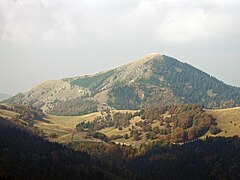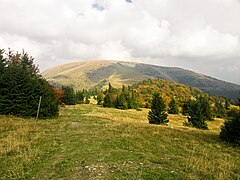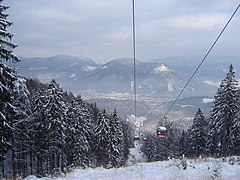Greater Fatra
Geology
In the geomorphological system, it is a part of the Fatra-Tatra Area. It is situated approximately among the towns of Ružomberok, Harmanec, Turčianske Teplice and Martin. The Turiec Basin and the Lesser Fatra mountains are situated to the north west of the range and the Low Tatras mountains are in the east. It can be divided into seven parts: Šípska Fatra, Šiprúň, Lysec, Hôľna Fatra, Revúcke podolie, Zvolen and Bralná Fatra.
The highest mountain is Ostredok at 1,596 m (5,236 ft). Other notable summits of the largest Hôľna Fatra part are Krížna at 1,574.3 m (5,165 ft) and Ploská at 1,532.1 m (5,027 ft), where the main ridge divides into two. The western Turiec Ridge (Slovak: Turčiansky hrebeň) includes, for example, Borišov at 1,509.5 m (4,952 ft), and the eastern Liptov Ridge (Slovak: Liptovský hrebeň) includes, for example, Rakytov at 1,567.0 m (5,141.1 ft). Bralná Fatra includes Tlstá at 1,373.3 m (4,506 ft) and Ostrá at 1,247.0 m (4,091.2 ft) summits. The Zvolen massif (1,402.5 m (4,601 ft)) connects the Veľká Fatra Range with the Low Tatra Range. One of the largest ski resorts in Slovakia - Skipark Ružomberok and Donovaly - lies beneath it. There are several other tourist and skiing resorts in the range.
A considerable part of the range is made of various Mesozoic rocks. The central part and the main ridge are made up of non-resistant rocks (slates) and the relief is softly modeled (Ploská, Ostredok). The southern and south-western part is formed by resistant limestone and dolomite with rocky walls and reefs. The ridges are usually separated by canyon-like valleys. The most important ones are Gader Valley (Gaderská dolina) and Blatnica Valley (Blatnická dolina). The longest valley is the Ľubochňa Valley (Ľubochnianska dolina) at 25 km. Numerous karst formations are located in this area and the Harmanec Cave is one of the best known caves in Slovakia.
Scenery
Nearly 90% of the area is covered by forests – beech and beech-fir forests, in some places replaced by spruce plantations and relics of pines. The area of Harmanec is the richest yew-tree site in Europe. The original natural upper borderline of forests was lowered during the Wallachian colonization. There are many extensive upland pastures, where cattle is raised in the summer.
Most of the area was protected by the Veľká Fatra Protected Landscape Area since 1973, and the most valuable parts are included in the Veľká Fatra National Park since 2002. The rest of the former protected landscape area serves as a buffer zone now.
The ruins of Blatnický and Sklabinský castles are located in this area. Also, the traditional architecture of Vlkolínec (a UNESCO's World Heritage Site) and Liptovské Revúce and the Ľubochňa and Turčianske Teplice spas can be found here.
Viewpoints
- Rakytov (1,567 m)
- Krížna (1,574 m) - the best view of the southern mountains - Kremnické vrchy, Poľana, Vtáčnik
- Tlstá (1,208 m) - view of Turiec basin
Gallery
-
Ploská
-
Typical rocks of the Bralná Fatra
-
Malinné ski resort
-
Panorama of Veľká Fatra
-
Rakytov
-
Čierny kameň
See also
References
- Brandos, Otakar (2004). Veľká Fatra, Šípska Fatra. Ostrava: SKY. ISBN 80-86774-02-3.
- VKÚ Harmanec (2003). Veľká Fatra. Edícia turistických máp 1:50000. Harmanec: VKÚ. ISBN 80-8042-044-0.
References
- ^ Lonely Planet Czech & Slovak Republics Lisa Dunford, Brett Atkinson - 2010 Page 57 "Central Slovakia ranges include the Low Tatras, reaching about 2000m, and the Malá Fatra and Veľká Fatra."
- ^ Lonely Planet Czech & Slovak Republics Lisa Dunford, Brett Atkinson - 2010 Page 310 "To the southwest [sic] the Veľká (Greater) Fatra mountains are far less popular and developed."
- ^ Rough Guide to The Czech & Slovak Republics Rob Humphreys, Tim Nollen - 2003 - Page 489 "Hiking in the Velka Fatra : To the east of the Turiec valley lie the Velka Fatra, a line of craggy mountain tops surrounded by a sea of uninhabited, undulating forest. The ridge of brittle limestone peaks from Krizna (1574m) to Ploska (1532m), via the highest of the lot, Ostredok (1592m), is the most obvious area to aim for, but the thin craggy valleys leading up to the mountains are actually much more enthralling to walk along: the two most accessible and geologically exciting are the Gaderska dolina and the Blatnicka dolina."








